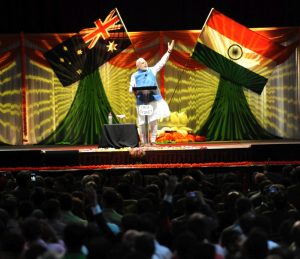Last week in the Sydney suburb of Harris Park, four Sikh men were reportedly attacked in their car by a group of men carrying bats and hammers. Speaking to police after the attack, the men identified their alleged attackers as fellow Indian Australians. The working assumption of the police is that the Sikh men were targeted because of the ongoing farmers’ protests in India, where the majority of protesters are Sikhs from the states of Punjab and Haryana. The alleged attackers are believed to be men who strongly identify with India’s ruling Bharatiya Janata Party (BJP).
The alleged attack follows an incident in mid-February when the New South Wales police stopped a convoy of cars, draped with Indian flags, that was attempting to drive by a Gurdwara (a Sikh temple) in the Sydney suburb of Glenwood in an apparent act of intimidation. If the working assumptions of these two incidents proves correct, it would be a clear demonstration of how the BJP’s identity politics is capturing segments of the Indian diaspora in Australia, presenting a distinct problem for the country’s authorities.
As a political party built around an ideology of religious nationalism, the BJP inspires a certain fervor among its supporters that when aroused can be difficult to restrain. For these “bhakts” — or devotees- – laws are not mutually agreed upon rules to govern human relations in a peaceful manner, but impediments to a higher calling. Vigilante violence has become a noticeable feature of the BJP’s political rise in India.
Due to its ideological mission, the BJP government of Narendra Modi has little tolerance for dissent. After rushing through new agricultural laws, rather than engage with the farmers’ anxieties and concerns about the potential impact on their livelihoods, the Modi government has instead tried to suppress and denigrate the farmers. The government narrative has painted the protesters as Khalistani separatists or other “anti-nationals” — the favored term used for anyone critical of the BJP. This is creating a further sense of insecurity for Sikhs, and a fear of a similar event to 1984 anti-Sikh pogrom.
The results of this denigration now appear to have surfaced in Australia. Yet the roots of such transnational identity politics do not simply lie with current events in India. The BJP has had a unique approach to its political ascension in that it has actively sought to cultivate an intimate relationship with the Indian diaspora. For the most part these are people who cannot vote in Indian elections, but they serve an ideological — and financial — purpose for the party.
These attempts to engage with the Indian diaspora can be seen through the various mega-rallies that Modi has held in Houston, London, and Sydney. These events are not organized by Indian embassies or consulates, but by the BJP itself. They are political, not diplomatic, events. Modi attends these rallies in his capacity as the leader of the BJP, not as the prime minister of India. Although they serve a purpose in burnishing Modi’s image for a domestic Indian audience, they are also designed to infuse the BJP’s ideas into the Indian diaspora.
The critical question for the Australian government is whether they should be allowing these kinds of rallies by foreign political parties in the country. If the knock-on effects of this form of diaspora engagement are acts of local violence that specifically target certain Indian Australian groups, then the value for Australia of this kind of foreign engagement by the BJP needs to be taken into serious consideration.
Yet due to Canberra’s strong desire to further enhance its relationship with India, and the BJP’s current political dominance, it is unlikely that the Australian government would feel itself capable of saying no should the BJP wish to hold another such event as it did at Sydney’s Olympic Park in 2014. And, of course, due to the global access to information, the BJP’s transnational influence would be impossible to restrict anyway.
Unfortunately, this influence is leading to a new — and mostly unwarranted — image of the Indian diaspora. It’s transforming the public’s perception of the diaspora from a highly successful, cohesive, valued, and law-abiding group into one driven by the political grievances and communal tensions of Indian domestic politics. Were this trajectory to be maintained it would be highly detrimental to the Indian Australian community, and for the broader support within the Australian public for increased ties with India.
Yet the fear is that the BJP’s ideological drive is a more powerful force than both these community level and state level calculations. Given the intensity of the BJP’s identity politics, attacks like the recent assault on the group of Sikh men in Sydney may not be the last.

































